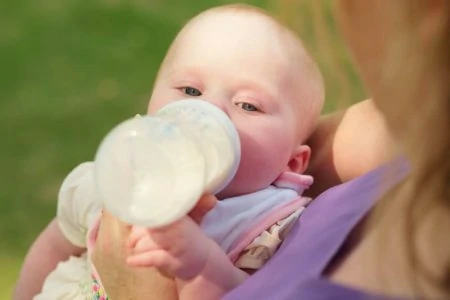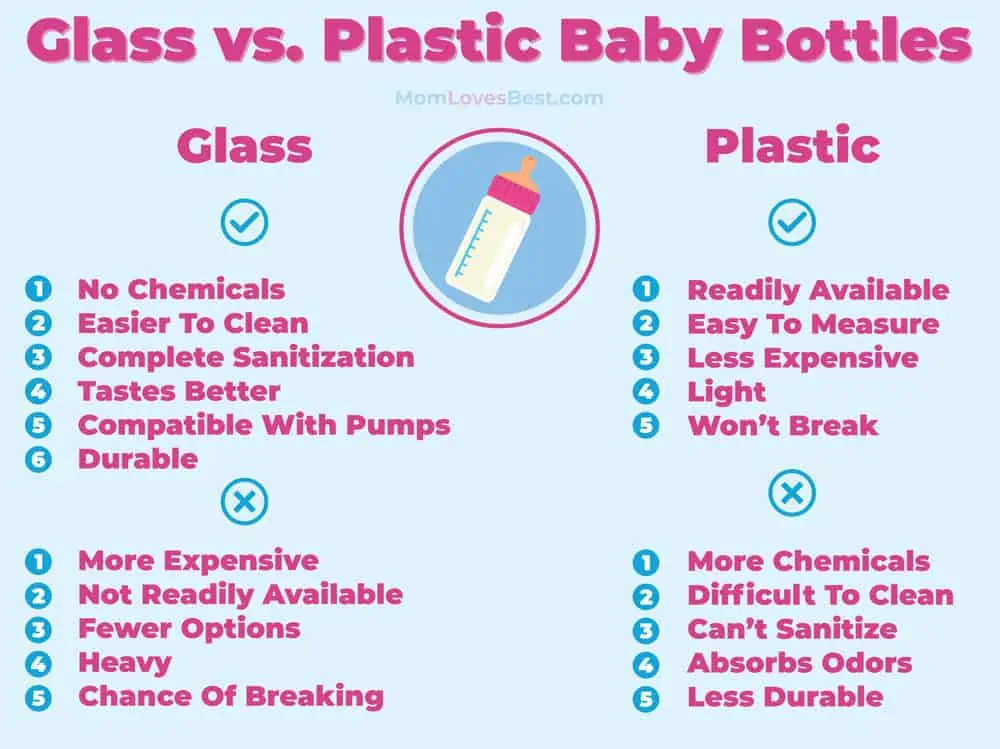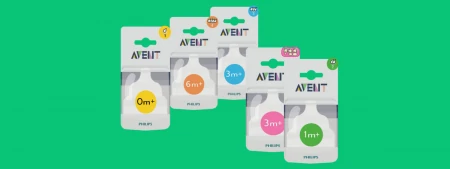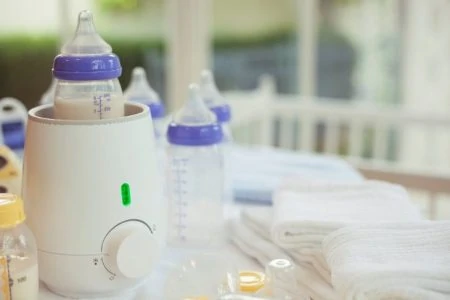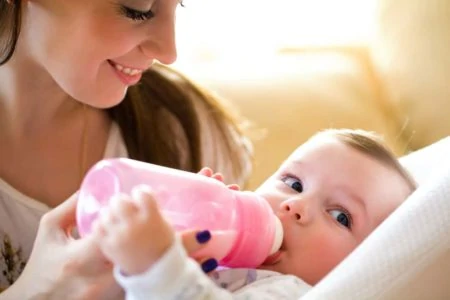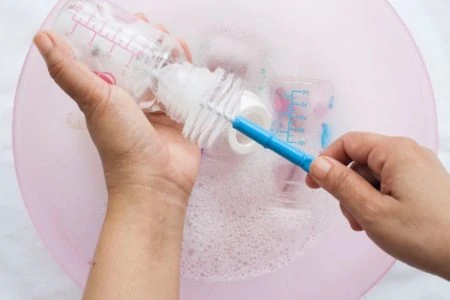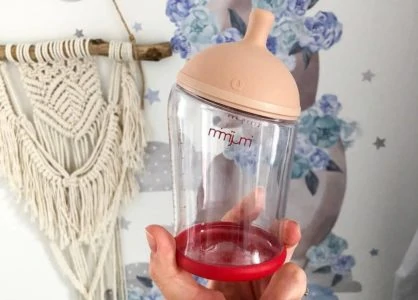Buying baby bottles can be a much more difficult task than it seems. There are so many choices! With the different materials, shapes, and sizes, how are you supposed to know which is best?
In this article, we’ll share our research and personal experience and cover the pros and cons of glass baby bottles versus plastic bottles. We’ll even discuss a third option you probably don’t know about, so you can make a conscious decision about which is best for your family.
Key Takeaways
- Pros of glass baby bottles include: no chemicals, easier to clean, complete sanitization, tastes better, and compatible with common breast pumps.
- Cons of glass baby bottles include: more expensive, not readily available in stores, having fewer options, being heavy, and slight chance of breaking.
- Plastic bottles are still the most commonly used baby bottles and have pros such as being lightweight, readily available in stores, and more affordable.
- Cons of plastic bottles include: potential chemicals leaching into milk, scratches can hold onto odors and residue, and can impart flavors into the milk.
Glass Baby Bottles
Glass baby bottles have been growing in popularity as moms are becoming more concerned about the chemicals in plastics. Years ago, it wasn’t easy to find a glass baby bottle, and they were costly. These days, they are available in some stores, and the price difference between glass bottles and plastic bottles has significantly decreased.
Pros of Glass Baby Bottles
These are a few of the advantages of glass baby bottles versus plastic bottles.
- No chemicals: Glass bottles contain no harmful chemicals, so there is no need to worry about chemicals leaching into your baby’s milk.
- Easier to clean: Glass baby bottles are much easier to clean than plastic because they are less likely to develop scratches that hold on to odors and residue. You can also plainly see when glass baby bottles are clean or dirty compared to plastic.
- Complete sanitization: You can heat glass to higher temperatures without worrying about any melting, so you can truly sanitize your bottles.
- Tastes better: Plastic bottles absorb odors and impart various “flavors” into breast milk or formula. Glass maintains the milk’s purity of taste.
- Compatible with common breast pumps: Using glass bottles doesn’t mean you need to buy separate bottles to fit your breast pump. Many glass bottles work with common breast pumps. For example, glass bottles that work with Medela pumps include Lifefactory, Avent, Born Free, Evenflo, Joovy Boob, and Dr. Brown’s.
- Durable: Glass bottles are more durable than plastic bottles. Unless they break, your glass bottles can last through multiple children.
Cons of Glass Baby Bottles
Although glass bottles have many positives, there are also a few negatives we must mention.
- More expensive: Glass baby bottles tend to be more expensive versus plastic bottles as the material is more costly, and making them is more time-consuming.
- Not readily available: You probably won’t find many glass bottles at your local Target or Walmart. This may mean either checking a local health food store or ordering them online.
- Fewer options: There aren’t nearly as many options for glass bottles as there are for plastic, but you still have a variety of styles to choose from online. Common glass bottles found on Amazon include Lifefactory, Avent, Dr. Brown’s, HEVEA, and Evenflo.
- Heavy: Glass bottles are usually heavier, which can make it difficult for your baby to hold as they get older and can add additional weight to your diaper bag.
- Slight chance of breaking: Our glass bottles have taken many hits to our hardwood floor, but we’ve never had a break. Unless your toddler is throwing it on concrete, the chances of your glass bottle breaking are relatively low. A silicone sleeve will significantly reduce the risk of breaking and will contain the shattering glass if it does break. Most glass bottles are made with reinforced glass. This means if they do break, they disintegrate into rounded pebbles rather than sharp shards, reducing the chances of your little one getting hurt.
Take Note
Most glass bottles are now also made with reinforced glass. This means if they do break, they disintegrate into rounded pebbles rather than sharp shards, reducing the chances of your little getting hurt.
Plastic Baby Bottles
Plastic bottles still win out as the most commonly used baby bottles. There are several reasons for this.
Pros of Plastic Baby bottles
These are some of the advantages of plastic baby bottles versus glass bottles.
- Readily available: You’ll readily find plastic bottles at local and chain retailers.
- Easy to measure: With their transparent material and clear markings, plastic bottles make it easy to measure how much milk your baby is drinking.
- Less expensive: Plastic bottles are generally less costly than glass bottles as the material is cheaper and they are quicker to make.
- Light: They are lightweight, making it easier for your baby to grip and hold on to their bottle as they get older.
- Won’t break: Plastic bottles might wear out sooner than glass bottles, but they are relatively unbreakable, and you won’t have to worry about shattered glass.
Cons of Plastic Baby Bottles
These are some of the disadvantages of plastic bottles.
- More chemicals: Even though nearly all plastic bottles are now BPA-free, they still contain other chemicals with estrogenic activity. Be cautious of buying the cheapest models as they may be made with unsafe chemicals.
- More difficult to clean: Plastic is prone to scratches, creating tiny spaces for bacteria to flourish and make cleaning difficult.
- Can’t truly sanitize: Plastic can’t withstand the amount of heat glass can. Too-high temperatures increase the risk of melting and create leaching concerns.
- Absorbs odors: Plastic is known to absorb odors, so you’ll have to deodorize your bottles more often than if you use glass.
- Less durable: Plastic bottles don’t last nearly as long as glass bottles. They’re more likely to get stained, scratched, or damaged and will eventually wear down.
Stainless Steel Baby Bottles
Still undecided on if you should choose glass or plastic? Well, there’s a third option you probably didn’t know about.
In recent years, stainless steel has made its way into the baby bottle market. But just as with glass and plastic, these bottles have their benefits and drawbacks.
Take Note
Stainless steel tends to have insulating properties and will keep your baby’s milk warmer longer. It is also easy to clean, less prone to scratches, and highly durable.
However, it’s difficult to measure how much formula or breast milk your baby is getting with stainless steel bottles. You’ll probably need to measure, mix, and heat in an alternative container, then transfer the milk to the stainless steel bottle. They are also hard to find and tend to be pricier than other bottle options.
FAQs
Choosing What’s Right
There are numerous choices when it comes to baby bottles.
Still, no matter how much research you do and which choice you think is best, your baby may think differently and ruin your well-thought-out plans. You may decide to use Joovy Boob glass bottles but discover that your baby will only drink from Munchkin Latch plastic bottles.
Because babies can be finicky, we recommend buying just one or two bottles of a few different kinds until you figure out which one your baby prefers. Then you can invest in a complete stash.
Whatever they choose, it’s great to know you have options. After reviewing the pros and cons, you can decide if you prefer glass baby bottles versus plastic bottles or if stainless steel bottles are what’s best for your little one.
